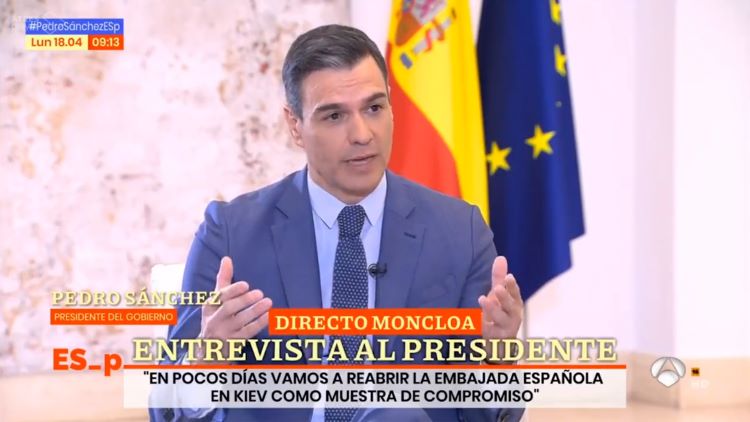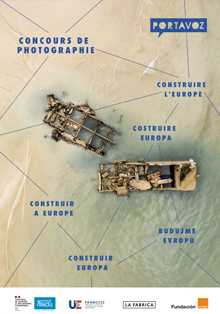Luis Ayllón/Eduardo González
Moncloa is preparing a visit by the President of the Government, Pedro Sánchez, to Kiev, which could take place in the next two or three days, with the aim of personally expressing his support for the Ukrainian President, Volodimir Zelenski, in the face of the Russian invasion, according to what The Diplomat has learned from reliable sources.
The same sources indicated that, in any case, the intention is for the trip to Ukraine to take place this week, which is why the Presidency of the Government is finalising the details so that the trip can take place with the greatest possible security guarantees.
To this end, Moncloa is in contact with the Ministry of the Interior to determine how the trip would be made and the protection that would be given to the presidential retinue, mainly through members of the Special Operations Group (GEO) of the National Police, especially when Sánchez is able to meet with the President of Ukraine, Volodimir Zelenski, as other European leaders have already done.
Zelenski was visited by the prime ministers of Poland, the Czech Republic and Slovenia in mid-March, followed by the President of the European Commission, Ursula Von der Leyen, and the EU High Representative for Foreign Affairs and Security, Josep Borrell, on 8 April. A day later, it was the British Prime Minister, Boris Johnson, who travelled to Kiev, and on 13 April the presidents of Poland and the Baltic States (Estonia, Latvia and Lithuania) travelled to Kiev.
Yesterday, the head of de Executive announced that Spain will reopen “in a few days” its Embassy in Kiev as a “sign of commitment to the Ukrainian people”.
“Spain is with Ukraine and we are against (Russian President Vladimir) Putin,” said Sánchez during an interview granted to the program Espejo Público, of Antena 3. “In fact, one of the things I would like to tell you is that, shortly, in a few days, we are going to reopen the Spanish Embassy in Kiev, as a sign of commitment of the Spanish Government, of the Spanish society, with the Ukrainian people”, he continued.
Both the ambassador, Silvia Cortés Marín, and the rest of the Spanish diplomatic delegation were evacuated on February 25, one day after the beginning of the Russian invasion of Ukraine. Last April 8, the EU High Representative for Foreign Policy, Josep Borrell, announced during his visit to Kiev (accompanied by the President of the Commission, Ursula Von der Leyen) the return of the head of delegation of the European Union in Ukraine. Besides, the French Embassy in Ukraine was reopened last Friday in Kiev and the Italian Foreign Minister Luigi Di Maio announced last week that his country’s Embassy would return to the Ukrainian capital after the Easter vacations. Slovenia has already reopened its diplomatic representation in the European Union. Lithuania, Czech Republic and Turkey, among others, have already announced their intention to return to Kiev. The Apostolic Nuncio of the Vatican, Lithuanian Archbishop Visvaldas Kulbokas, has remained at his post in the Ukrainian capital at all times, even after the invasion.
During the same interview, Pedro Sanchez stated that “it is clear that Europe’s main deterrent force against Putin is unity, and the debates have to be approached from that perspective, from unity”, because “any element of division or separation of perspectives that we member states may have weakens us”.
“We all have to be aware that this war is not only a war between Russia and Ukraine, it is a war by Putin also against what the EU stands for in terms of fundamental rights, in terms of democracy, the defense of freedom and a model of prosperity based on social justice,” he continued. “All of that is what Putin is calling into question, and if we did nothing, if we allowed Putin to ravage Ukraine and looked the other way, the cost would be even greater,” he added.
Therefore, “I believe that the perspective that the EU is taking of unity in the response to Putin and, secondly, of accelerating everything that represents the green energy transition so that Germany, Poland, those countries that are highly dependent on Russian gas, can depend more and more, as Spain and Portugal do, on renewable energies, is the perspective that we have to lead and guide in the short and medium term,” he added.
Margarita Robles
For her part, the Minister of Defense, Margarita Robles, yesterday showed herself to be particularly interested and concerned about the possible use of chemical, biological and radiological weapons during the war in Ukraine. “Nothing can ever be ruled out, we are in a war with a special cruelty, it is a scenario that must be kept in mind,” she told the media during her visit to the Defense Toxicology Institute at the Central Defense Hospital Gómez Ulla, in Madrid, a reference center in the toxicological field of the Armed Forces and also national.
However, “there is no need to alarm anyone because it is not proven to be so”, said the minister, who, in any case, warned of the need to be prepared for a possible radioactive or chemical attack “because, unfortunately, these types of weapons are very easy to manufacture in laboratories”.







